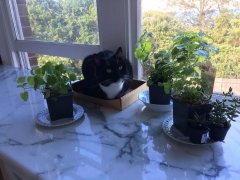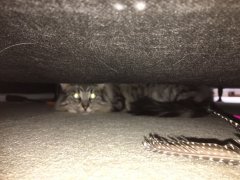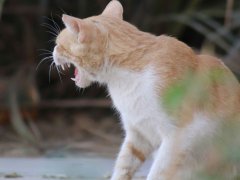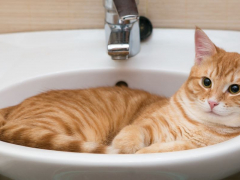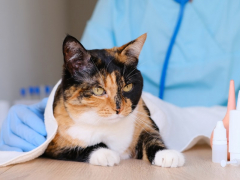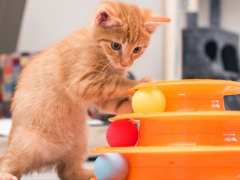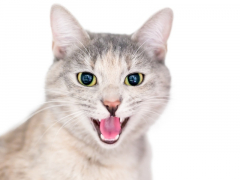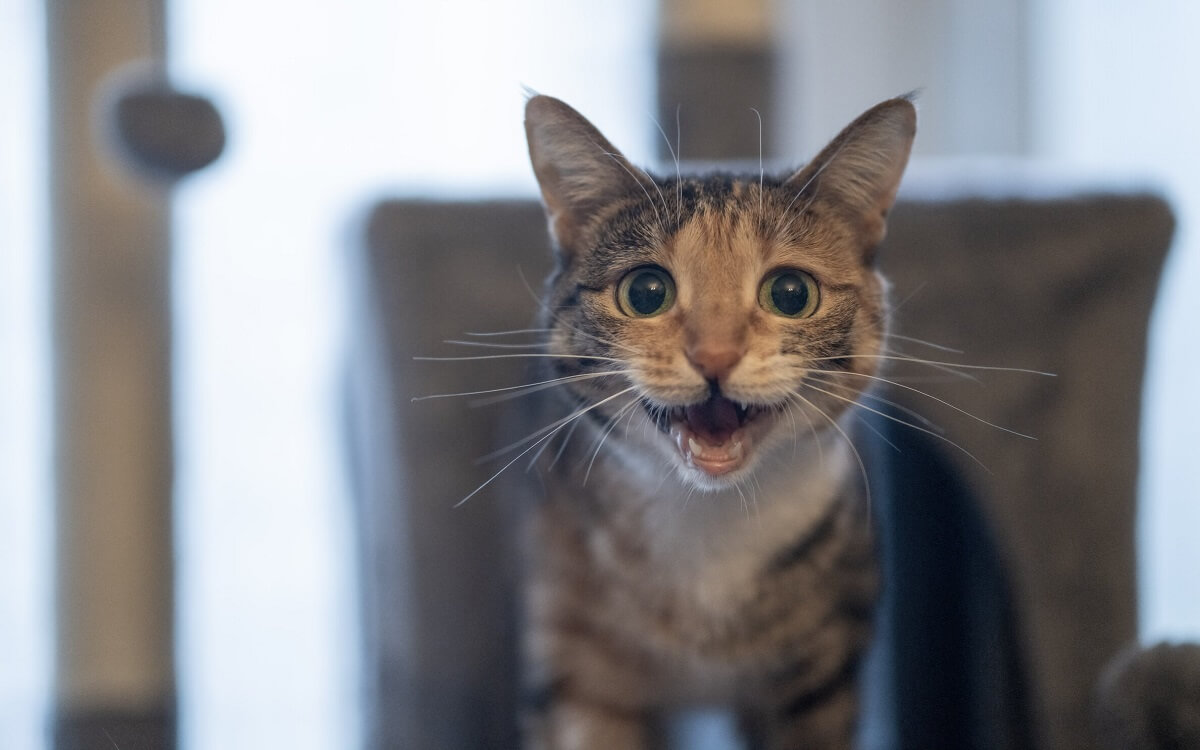
Some cats are more vocal than others, greeting you with a meow when you walk through the door, or yowling at you for their dinner. Most of the time, it’s pretty cute when your cat “talks” to you. But what if your cat is yowling at night?
Yowling is a very different sound from meowing, and it usually means your cat is trying to communicate something. Cats might yowl at night due to boredom, stress, or anxiety. Yowling at night can sometimes be a signal of a medical problem, so if it's a recent behavior it's important to have your cat checked out by a veterinarian.Key Takeaways
This can be a problem, particularly if your kitty’s vocalizations are disturbing your much-needed rest. Although yowling at night can be normal for some cats and nothing too much to worry about, it might also be a sign that something is wrong. Read on to learn about the possible reasons for your cat’s night-time yowling, and a few things you can do to try and stop it.
Why Do Cats Meow?
Did you know that cats do not meow at each other to communicate? Cats communicate with other cats primarily via scent and pheromones. Meowing is a learned behavior and is only used to communicate with us humans!
So, if your cat is meowing at you, she is trying to tell you something important. Different meows can mean very different things depending on the context of the situation. Pay attention and you will soon learn what your cat’s meows are trying to tell you!
What Is Yowling?
Yowling is a very different sound from a meow and although your cat is trying to communicate something, it isn’t always necessarily directed at you. Cats can also make other sounds such as whines, and howls. If your cat is particularly persistent or determined, they might “caterwaul,” which is a sustained sound that is a cross between a yowl, a whine, and a howl. It can be noisy and sound very dramatic.
Why Is My Cat Yowling at Night?
Yowling at night disturbs everyone in the household and it’s natural to wonder why on earth your cat is making so much noise when the rest of the house is trying to sleep. So, let’s take a closer look at some possible explanations for your cat’s nocturnal vocalizations.
Cats Are More Active at Night
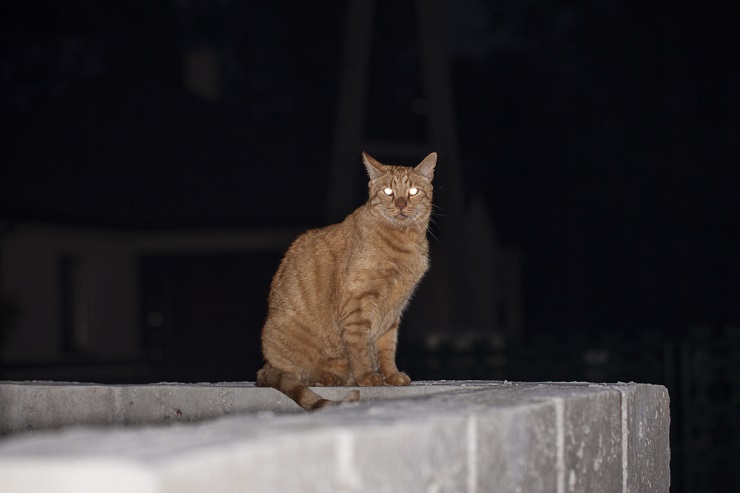
Cats are most active at dawn and dusk, which can interrupt their humans’ normal sleeping time.
Contrary to popular belief, cats are not nocturnal but are actually crepuscular, meaning that they are most active at dawn and dusk. This is because these are times when prey species such as small mammals are more active so it’s a good time for cats to hunt.
Unfortunately, most people are in bed sleeping in the early hours of the morning, when your cat might naturally be more active. Cats generally do adapt to their owner’s sleep routine over time but if you have a young cat, you might be in for a few early morning wake-up calls before they adjust to your schedule!
They Are Bored
Your cat might be yowling at night because they are bored and want someone to play with. This is especially likely if your cat hasn’t had enough mental stimulation during the day to tire them out.
Outdoor cats can generally find enough to occupy themselves but indoor cats are prone to boredom as they are not able to satisfy their natural hunting instincts and have no new environments to explore. If your cat doesn’t have much to do during the day, they will probably choose to sleep more, meaning that by the time your bedtime comes around, your cat is wide awake and ready for action!
They Are Anxious
Cats sometimes yowl or cry during the night if they are feeling anxious. This could be because of a recent house move or a new baby in the family. It might even be that they’re feeling threatened by a new cat in the neighborhood. Cats are creatures of routine and if this routine is disturbed, it can leave them feeling unsettled and anxious.
They Want To Go Outside
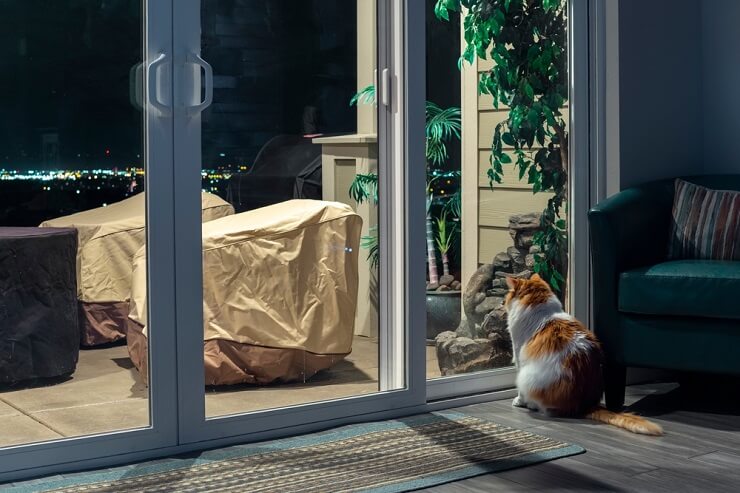
Yowling at night could just be your cat’s way of saying they want to go outside.
Your cat’s nighttime yowling could be down to something as simple as wanting to go outside. Many people choose to keep their cats inside overnight to keep them safe or prevent them from bringing in dead prey.
As we’ve already learned, cats are more active in the evening and early hours of the morning, meaning that being kept inside during these times can be a source of frustration for them.
Cats are also much smarter than we give them credit for. If in the past you’ve let your cat outside in an attempt to keep the nighttime peace, they will have learned that yowling has worked previously and will probably continue to yowl whenever they decide they want to be let out in the future.
She’s in Heat
When female cats come into heat, they often make all sorts of different noises including yowls to let male cats in the area know that she is ready to be mated. This is referred to as calling. Male cats often make some strange noises of their own in response to these calls.
A female cat will usually be in heat for around a week. She will then come out of heat for a few days before returning to being in heat again. This cycle can repeat several times and can last for many months—that’s a lot of yowling to deal with!
They Are Aging
As cats age, they might suffer from hearing loss and/or reduced vision. This can cause cats to become more disorientated, particularly at night when it is dark and they are seemingly alone once everyone is in bed.
Your cat might be yowling in frustration because they are confused and feeling anxious. Cats with hearing loss are likely to yowl even louder than usual as they are unable to hear the full extent of their own noise.
Elderly cats can also suffer from a condition called cognitive dysfunction, which is a bit like dementia in people. It disrupts their sleep-wake cycle, which might mean that your cat is awake at times when they never used to be.
Your cat might also show other signs of cognitive decline such as staring at walls or pacing up and down. Some cats seem to forget things like where the cat flap is, or whether or not they’ve eaten. Cats with cognitive dysfunction will often yowl and howl at night out of confusion and frustration.
They Are Sick
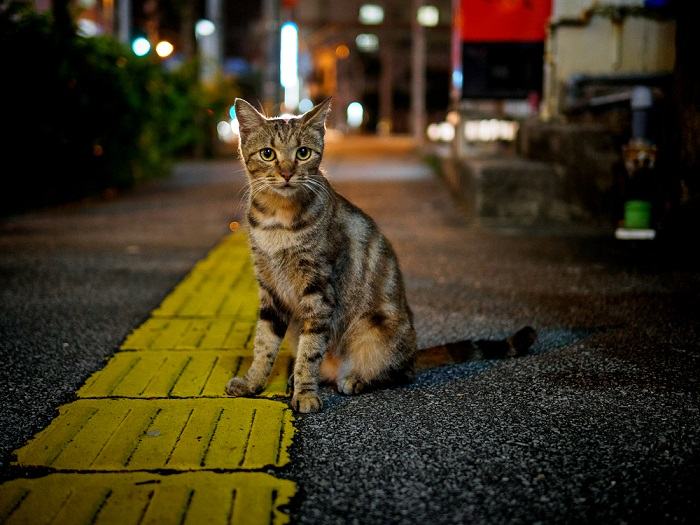
Yowling at night is sometimes a symptom of a medical issue.
Excessive meowing at night time can sometimes be a symptom of diseases such as an overactive thyroid or kidney disease. Arthritis can sometimes cause nocturnal vocalization because your cat is in pain and struggling to settle into a comfy resting position.
How Can I Stop My Cat From Yowling at Night?
Whatever the cause, you’ll want to stop your cat from yowling at night not only for their own benefit but for yours, too. There are a few things you can do to try and stop your cat from yowling at night.
Provide a Cat Flap
If your cat is yowling in the night to be let outside, you could provide a cat flap so they can come and go as they please, without having to disturb the entire household.
If this isn’t possible, do not give in and get up in the night to let your cat out or they will learn that crying for your attention is worth it because it works! It might take a while but eventually your cat will learn that yowling is not going to be answered and hopefully they will give up.
Provide Mental Stimulation
If your cat is yowling at night because they are bored, it’s likely that they haven’t had enough mental stimulation during the day. Providing sufficient mental stimulation is especially important if you have an indoor cat.
Spend some quality time each day playing with your cat but keep play sessions short so as not to overtire them. If your cat spends long periods without anyone else at home, then leave some interactive toys for them to play with while you’re out. Treat dispensers, puzzle toys, cat trees, and ball runs all make great toys for solo play.
Pheromone Therapy
If you suspect that your cat’s excessive vocalization at night is because of anxiety, you could consider trying artificial pheromones. Although they are undetectable to humans, cats are very sensitive to the effects of pheromones.
When cats rub their heads or bodies on surfaces around your house, or against you, they are releasing pheromones that signal that they are relaxed and happy. Feliway makes synthetic pheromones in the form of sprays or plug-in diffusers and they can help your cat feel more relaxed and ease anxiety.
Spay or Neuter Your Cat
Spaying your female cat will stop her from coming into heat and so prevent the associated yowling. Castrating your male cat will reduce the likelihood of him yowling to answer the calls of a female that’s in heat.
Take Your Cat to the Veterinarian
If you have ruled out other causes of nighttime yowling, then take your cat to the veterinarian for an examination. Your vet can check for underlying illnesses such as arthritis, cognitive dysfunction, an overactive thyroid, or kidney disease, especially if you have an older cat. Your cat might need medication, which can sometimes reduce or stop yowling at night.
Adapt Your House
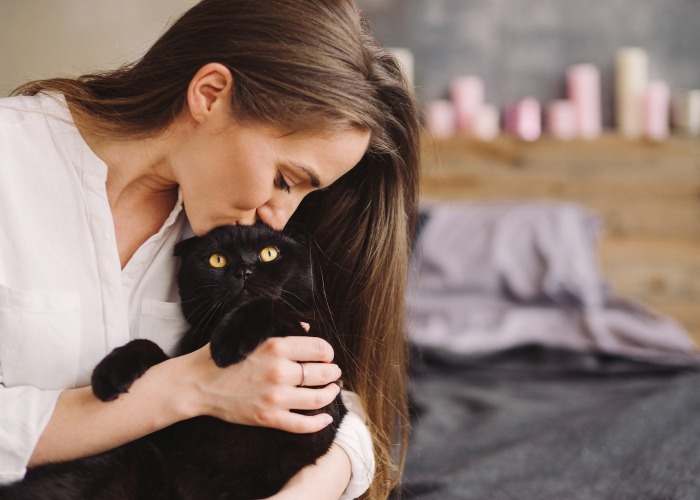
For cats with vision loss, nightlights installed around the house can help your cat navigate in the dark.
If your cat is aging and losing their vision, nightlights around the house can help them navigate their way and reduce their confusion. Allowing your cat access to your bedroom at night can help reassure them that you are close by and might help to reduce any anxiety-related yowling.
In Summary
If your cat is yowling at night, they are trying to communicate something to you, so it’s important to try and figure out what that is.
Although nighttime yowling might not be anything serious, you need to address the issue to ensure that your cat isn’t unwell and that their needs are being met. If you have tried some of the suggestions in this article and your cat continues to vocalize at night, it’s time to take them to the veterinarian to get them checked out, so you can all have a peaceful night’s sleep.
Also Read: Why Do Cats Curl Into Balls When Sleeping? A Veterinarian Explains
Frequently Asked Questions
Should I ignore my cat yowling at night?
You should ignore your cat yowling at night if they are doing it for attention. If your cat learns that yowling gets your attention, they will continue to do it. There are many reasons for nighttime yowling though, and attention-seeking is just one of them. Rule out the other causes first before you decide to ignore your kitty’s nocturnal vocalizations.
How do I calm my cat down at night?
If your cat seems anxious or unsettled overnight then it could be due to an underlying medical problem. Take your cat to the veterinarian to get them checked out. If your cat is anxious at night because of a change in routine, then calming supplements or using Feliway might help to keep them calm and relaxed.
How do I stop my cat from yowling?
To stop your cat from yowling, you first need to determine the reason for the excessive noise. Take your cat to the veterinarian to get them checked out if you are unsure why they're yowling. Never tell your cat off or punish them for yowling.
